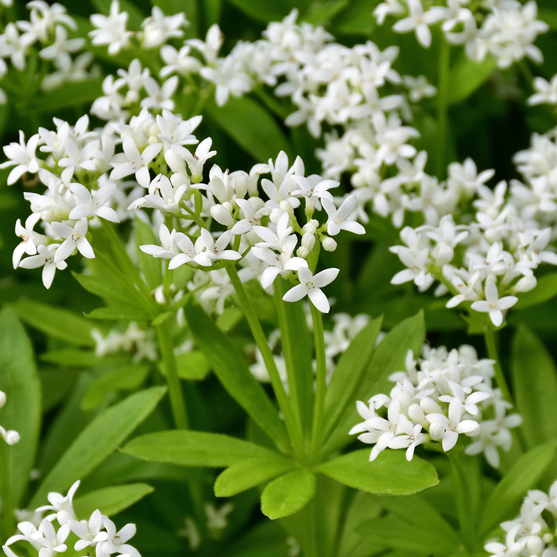
Sweet woodruff
Scientific names: Galium odoratum, Asperula odorata
Family: Rubiaceae
Alternate names: Aspérula, Aspérule, Aspérule Odorante, Galii Odorati Herba, Master of the Wood, Petit Muguet, Reine des Bois, Thé Suisse, Waldmeister, Woodruff, Wordward
Background
Sweet woodruff (Galium odoratum) is a plant native to Europe, Iran, Siberia, and Northern Africa. Its leaves and flowers are used as medicine.
Sweet woodruff contains chemicals that might help heal wounds and burns.
People use sweet woodruff for high blood pressure, insomnia, migraine headache, wound healing, and many other conditions, but there is no good scientific evidence to support these uses.
Sweet woodruff contains chemicals that might help heal wounds and burns.
People use sweet woodruff for high blood pressure, insomnia, migraine headache, wound healing, and many other conditions, but there is no good scientific evidence to support these uses.
Safety Safety definitions
When taken by mouth: Sweet woodruff is commonly consumed in foods. It is possibly safe when used in larger amounts as medicine, short-term. It's generally well-tolerated. Side effects might include headache.
When applied to the skin: There isn't enough reliable information to know if sweet woodruff is safe or what the side effects might be.
Bleeding disorders: Sweet woodruff contains certain chemicals that might slow blood clotting. This might increase the risk of bruising and bleeding in people with bleeding disorders.
Surgery: Sweet woodruff contains chemicals that might slow blood clotting. This might cause extra bleeding during and after surgery. Stop using sweet woodruff at least 2 weeks before a scheduled surgery.
When applied to the skin: There isn't enough reliable information to know if sweet woodruff is safe or what the side effects might be.
Special Precautions & Warnings:
Pregnancy and breast-feeding: There isn't enough reliable information to know if sweet woodruff is safe to use when pregnant or breast-feeding. Stay on the safe side and avoid use.Bleeding disorders: Sweet woodruff contains certain chemicals that might slow blood clotting. This might increase the risk of bruising and bleeding in people with bleeding disorders.
Surgery: Sweet woodruff contains chemicals that might slow blood clotting. This might cause extra bleeding during and after surgery. Stop using sweet woodruff at least 2 weeks before a scheduled surgery.
Effectiveness
Effective Effectiveness definitions
There is interest in using sweet woodruff for a number of purposes, but there isn't enough reliable information to say whether it might be helpful.
Dosing & administration
There isn't enough reliable information to know what an appropriate dose of sweet woodruff might be. Keep in mind that natural products are not always necessarily safe and dosages can be important. Be sure to follow relevant directions on product labels and consult a healthcare professional before using.
Interactions with pharmaceuticals
Medications that slow blood clotting (Anticoagulant / Antiplatelet drugs)
Interaction Rating=Moderate Be cautious with this combination.
Sweet woodruff might slow blood clotting. Taking sweet woodruff along with medications that also slow blood clotting might increase the risk of bruising and bleeding.
Interactions with herbs & supplements
Herbs and supplements that might slow blood clotting: Sweet woodruff might slow blood clotting and increase the risk of bleeding. Taking it with other supplements with similar effects might increase the risk of bleeding in some people. Examples of supplements with this effect include garlic, ginger, ginkgo, nattokinase, and Panax ginseng.
Interactions with foods
There are no known interactions with foods.
vital.ly has licensed monographs from TRC Healthcare.
This monograph was last reviewed on 14/02/2025 11:00:00 and last updated on 26/09/2014 20:54:12. Monographs are reviewed and/or updated multiple times per month and at least once per year.
Natural Medicines disclaims any responsibility related to medical consequences of using any medical product. Effort is made to ensure that the information contained in this monograph is accurate at the time it was published. Consumers and medical professionals who consult this monograph are cautioned that any medical or product related decision is the sole responsibility of the consumer and/or the health care professional. A legal License Agreement sets limitations on downloading, storing, or printing content from this Database. No reproduction of this monograph or any content from this Database is permitted without written permission from the publisher. It is unlawful to download, store, or distribute content from this site.




